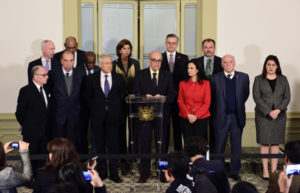Nicolás Comini – Lima Group: Committed to Democratic Principles?
Published in AULA Blog: https://aulablog.net/2018/01/30/lima-group-committed-to-democratic-principles/
By Nicolás Comini*
The “Lima Group” – an informal alliance of 12 Latin American countries created to observe the sensitive situation in Venezuela – has shown that its defense of democracy in the hemisphere is inconsistent. Argentina, Brazil, Canada, Chile, Colombia, Costa Rica, Guatemala, Honduras, Mexico, Panama, Paraguay, and Peru have on at least a handful of occasions condemned Venezuelan President Nicolás Maduro for stoking political violence, holding political prisoners, committing electoral fraud, and engaging in other abuses, justifying their positions as based on ethics, morals, and good practices.
The reactions of the Lima Group and its leading members to the situation in Honduras since that country’s presidential election in November, however, suggests that the values they espouse do not have universal application. After OAS Secretary General Luis Almagro declared that the election lacked credibility and called for new elections, some countries’ pro-democracy fervor faded.
- Argentine President Mauricio Macri’s administration quickly recognized Honduran President Juan Orlando Hernández’s victory and officially declared its “disposition to continue working for the development of closer ties of friendship and more cooperation between the two nations.” The Brazilian foreign ministry expressed its “commitment to maintain and strengthen the ties of friendship and cooperation that traditionally have united both countries.” In Mexico, President Enrique Peña Nieto’s government quickly recognized Hernández as well, calling on “Honduran society to support dialogue in order to preserve peace and democratic stability in that sister nation.”
The discrepancies between the group’s rhetoric and actions appear to be rooted in various reasons.
- Political alignments take precedence over values. Honduran President Hernández has been active in the group’s (and indirectly the OAS’) efforts on Venezuela. Honduras is a member of the Lima Group, and Hernández is perceived by conservative governments as an ally to contain the spread of the left. The risk of massive Venezuelan population displacement, with profound potential consequences for neighboring countries, contrasts with the situation in Honduras. With the region entering a new election cycle, moreover, incumbents’ lack of support for Almagro’s position signals that they do not want the OAS messing around in their own electoral processes.
- These governments also see Hernández as a strategic United States ally in Central America in combating drug trafficking, transnational criminal networks, money laundering, and irregular migration. Many of the governments may also refrain from criticizing the belief that Tegucigalpa benefits from the presence of 1 million Hondurans in the United States (more than half of whom the State Department says “are believed to be undocumented”). In addition, Honduras was one of the eight countries that supported President Donald Trump’s rejection of the UN General Assembly Resolution asking nations not to locate diplomatic missions in Jerusalem.
The crises in Venezuela and Honduras are indeed different, and the international community’s interests in them are naturally different. Maduro’s and Hernández’s failings affect other countries’ political and economic equities in different ways. Maduro’s undemocratic actions increase unpredictability in the management of oil and other sectors of foreign interest, whereas Hernández’s represent predictability, if not stability, in areas that Washington cares about and Buenos Aires, Brasilia, and the rest of Latin America do not. But the high-sounding values at stake – democracy, institutionality, and rule of law – are the same in both countries. While Venezuela’s population is three times the size of Honduras’ and its political crisis arguably three times more advanced, the moral responsibility – and moral authority – of the Lima Group or its member nations is many times greater in a small, vulnerable, poor country like Honduras. Security forces have gunned down some three dozen oppositionists and protestors since the November election, and allegations of human rights violations have soared, but Latin America’s major democracies have been silent.
- The failure to support the OAS’ call for new elections was not just a stab in the back of Secretary General Almagro; it revealed that their rhetoric about the OAS Democracy Charter – embodiment of democratic values they demand be respected in Venezuela – are not as universal as they say. When the Lima Group last Tuesday (with considerable justification) rejected the Venezuelan National Assembly’s call for an early presidential election, the Hernández government’s signature was there alongside the others. If universal democratic values and principles are not for universal application – if even an informal grouping will not criticize a small actor with whom they do not have major equities at stake – their value is much diminished.
January 30, 2018
* Nicolás Comini is Director of the Bachelor and Master Programs in International Relations at the Universidad del Salvador (Buenos Aires) and Professor at the New York University-Buenos Aires. He was Research Fellow at CLALS.

